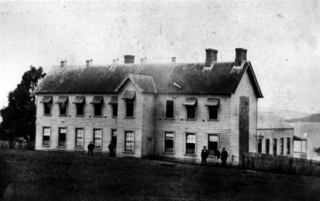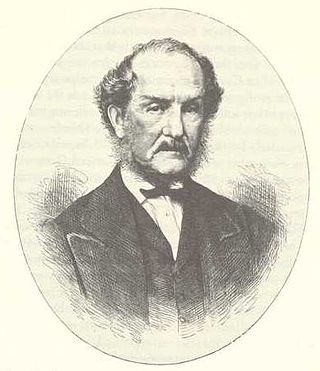Related Research Articles

The 1st New Zealand Parliament was a term of the Parliament of New Zealand. It opened on 24 May 1854, following New Zealand's first general election. It was dissolved on 15 September 1855 in preparation for that year's election. 37 Members of the House of Representatives (MHRs) represented 24 electorates.

Isaac Earl Featherston, popularly known as the Little Doctor, was a New Zealand politician, known for his advocacy for the establishment of New Zealand self-government, and the importance of the provincial governments.
Samuel Revans was a New Zealand newspaper owner, entrepreneur and politician. He was the Father of Journalism in New Zealand.

William Sefton Moorhouse was a British-born New Zealand politician. He was the second Superintendent of Canterbury Province.
The 2nd New Zealand Parliament was a term of the Parliament of New Zealand. It opened on 15 April 1856, following New Zealand's 1855 election. It was dissolved on 5 November 1860 in preparation for 1860–61 election. The 2nd Parliament was the first under which New Zealand had responsible government, meaning that unlike previously, the Cabinet was chosen by Parliament rather than by the Governor-General of New Zealand.

The 19th New Zealand Parliament was a term of the New Zealand Parliament. It opened on 24 June 1915, following the 1914 election. It was dissolved on 27 November 1919 in preparation for 1919 election.

Wairarapa is a New Zealand parliamentary electorate. It was first created in 1858 and existed until 1881. It was recreated in 1887 and has since existed continuously. The current Wairarapa electorate MP is Mike Butterick.

Charles Bonython Borlase was Mayor of Wellington, New Zealand in 1874. He had been a member of the first Wellington Town Board in 1863, and a Councillor to 1874. He held the position of Provincial Solicitor from 1857 until his death in 1875.
Hutt was a New Zealand parliamentary electorate. It was one of the original electorates in 1853 and existed during two periods until 1978. It was represented by 13 Members of Parliament.
Wanganui and Rangitikei was a parliamentary electorate that existed from 1853 to 1860, represented by two Members of Parliament.
Wellington Country was a former parliamentary electorate in the Wellington Region from 1853 to 1860 and then 1871 to 1881. The seat covered Miramar, Mākara, Porirua, the Kāpiti Coast and the Horowhenua District.
Wairarapa and Hawke's Bay is a former parliamentary electorate in the Wellington region of New Zealand from 1853 to 1859, when it was extended into previously unincorporated territories, split in two, and replaced by the County of Hawke, with its southern portion being the newly created Wairarapa electorate. It is the first general electorate to have been abolished in New Zealand.
Wellington, was a parliamentary electorate in Wellington, New Zealand. It existed from 1853 to 1905 with a break in the 1880s. It was a multi-member electorate. The electorate was represented, over the years, by 24 members of parliament.
Christchurch Country was a parliamentary electorate in the Canterbury region of New Zealand from 1853 to 1860. It was thus one of the original 24 electorates used for the 1st New Zealand Parliament.
Heathcote was a 19th-century parliamentary electorate in Christchurch, New Zealand.
Waimea was a parliamentary electorate in the Nelson Province of New Zealand, from 1853 to 1887. Initially represented by two members, it was a single-member electorate from 1861.
The New Zealand Constitution Act 1852 authorised the General Assembly to establish new electoral districts and to alter the boundaries of, or abolish, existing districts whenever this was deemed necessary. The rapid growth of New Zealand's European population in the early years of representative government meant changes to electoral districts were implemented frequently, both at general elections, and on four occasions as supplementary elections within the lifetime of a parliament.
The Southern Division by-election 1858 was a by-election held in the multi-member Southern Division electorate during the 2nd New Zealand Parliament, on 8 May 1858.

The Dunedin Country by-election 1858 was a by-election held in the multi-member Dunedin Country electorate during the 2nd New Zealand Parliament, on 16 June 1858. The by-election was caused by the resignation of incumbent MP John Cargill and was won by John Taylor.
The 1858 Hutt by-election was a New Zealand by-election held in the multi-member electorate of Hutt during the 2nd New Zealand Parliament on 31 July 1858, following the resignation of Dillon Bell and Samuel Revans on 22 March. The election was won by Alfred Renall and William Fitzherbert, who had resigned from the multi-member electorate City of Wellington in order to contest this by-election. That resignation forced a by-election to happen. Two other candidates unsuccessfully contested the electorate, George Hart and Peter Cheyne.
References
- 1 2 "The General Assembly Election". The Wellington Independent. Vol. X, no. 1310. 28 July 1858. p. 3. Retrieved 17 May 2013.
- ↑ Scholefield, Guy, ed. (1940). A Dictionary of New Zealand Biography : A–L (PDF). Vol. I. Wellington: Department of Internal Affairs. pp. 83f. Retrieved 18 June 2016.